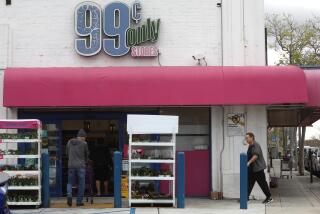Grocery King Isn’t Content to Sit on Shelf
- Share via
When Gerald Awes opened his second Food Basket grocery in San Diego in the early 1950s, John Mabee served as the store manager and S. Donley Ritchey was a rookie bag boy fresh out of La Jolla High School.
The three men were destined to play important roles in Southern California’s rapidly expanding grocery industry: Awes and Ritchey stayed with the San Diego-based Food Basket chain after it was acquired by Lucky Stores in 1956. Both men eventually served as chairman of Lucky.
But Mabee, who had operated a small San Diego grocery store before joining Food Basket, decided to strike out on his own. By 1952, he had opened two Big Bear grocery stores in San Diego.
Mini-Empire Flagship
Big Bear, which is still owned by the Mabee family, is now the flagship of a growing business mini-empire. With 18 stores, Big Bear is San Diego’s largest locally owned grocery chain and the county’s fifth-largest chain overall. The Mabees also own the 10-store Par Liquor chain, two Jonathan’s upscale grocery stores and the six-store Cook’s Market chain in Imperial County.
In the past three decades, Big Bear has grown steadily in San Diego County, weathering an onslaught of new competitors, including Safeway, Lucky, Vons and Ralphs, and the wave of consolidations that has affected many independent grocery chains.
Competitors said Big Bear has kept its customers by developing an image as a chain of neighborhood stores that provide fresh produce, quality meats and high-quality service. But it has remained independent largely because John Mabee simply did not want to sell out, according to Ritchey, whose first grocery business job was as a bag boy for Mabee.
“Ralphs, Vons and several other chains in the Los Angeles market were all, at one time, great family companies that were very successful,” Ritchey said. “But, at some point, for whatever reason, they decided they weren’t going to go forward by themselves.”
In recent years, Mabee has reduced his involvement in Big Bear, becoming active in San Diego’s booming real estate market, principally in apartment and commercial development. The 67-year-old San Diegan also owns Golden Eagle Insurance, one of California’s fastest-growing property and casualty insurance companies, and last year acquired a 20% interest in San Diego-based Bank of Southern California.
Mabee has also joined the country’s growing thoroughbred industry as owner of the 560-acre Golden Eagle ranch in Ramona, home to about 500 thoroughbreds. During 1986, Mabee’s horses won 118 races in 892 starts at tracks around the world, earning $2.2 million. He said his horses improved on that record in 1987 and will do even better this year.
Success on Diverse Fronts
Nineteen years ago, Mabee was elected to the Del Mar Thoroughbred Club, a nonprofit organization that has run the annual 43-day racing season. Mabee, who was elected president 10 years ago, has been active in negotiations to renew that contract, which expires in 1989.
The club may have the inside track, because rival groups--including spray paint baron Earl Scheib, Hialeah Park race track owner John Brunetti and a partnership involving the Nederlander entertainment group--have submitted proposals that include non-racing programs that might be at odds with use policies set by the Del Mar Fair Board, which governs the track.
Mabee’s success on such diverse fronts comes as no surprise to former business associates and competitors.
“John was a hard-driving, aggressive but totally personable guy,” according to Ritchey, who retired three years ago after serving five years as Lucky’s chairman. “He was a clear leader who always knew what was going on in that store. It was no surprise to me that he went on to do his own thing.”
Awes, who first hired Mabee as a sales clerk, realized that the one-time Iowa farm boy was a quick study. “He was such a capable individual that, within a few days . . . I more or less made him my No. 1 man,” Awes recalled.
Competitors credit Mabee with having a solid grasp on the grocery business in San Diego County, where stiff competition from large chains, the Price Co. discount warehouse stores and military base stores regularly produces some of the nation’s lowest food prices.
Won’t Disclose Revenues
Mabee has succeeded “in an industry with very low profit margins (where) you have to be a competent executive to be successful,” according to Jack H. Brown, chairman of San Bernardino-based Stater Bros. Markets, a 98-store chain that will report $1 billion in revenue in 1988.
Mabee refuses to disclose revenue or profits from his operations, but he does indicate that the insurance and real estate operations are more profitable than the grocery business.
Big Bear is probably one of the nation’s 100 largest chains, with an estimated $175 million in 1986 revenue, according to Progressive Grocer Marketing Guidebook, a Stamford, Conn.-based trade magazine
The chain will add at least two stores during coming years, according to Larry Mabee, who took over day-to-day management of the stores from his father three years ago.
Mabee won’t disclose his net worth, which measures in the millions of dollars. However, friends, business associates and competitors commend him and his wife, Betty, for handling their wealth with grace.
“They are very wealthy, but in the case of John Mabee, he never wears (that wealth) in the sense of bragging about it,” said Tom Stickel, a local San Diego businessman recently elected to the Del Mar Thoroughbred Club. “He’s got the prestige and contacts, but he’s a very, very humble man. There’s not a bit of boastfulness in the man.”
‘A Tough Competitor’
Former San Diego Chargers owner Gene Klein, whose horses regularly race against Mabee’s at the Del Mar track, knows Mabee as “a very tough competitor. . . . I have the highest regard and respect for him,” not only as a horseman and businessman, “but as a fine, astute civic leader.”
Labor leaders seem to share that regard. “We’ve always had an excellent relationship with John Mabee,” according to Tom Vandeveld, president of United Food and Commercial Workers Local 135. “He’s a good, sound businessman, and he has always shown concern for his employees.”
Like many transplanted San Diegans, Mabee did not simply happen upon the city. He instead decided as a youngster that he didn’t want to remain on his parents’ farm in rural Iowa. He picked San Diego after reading magazine articles that described the city’s climate as the most hospitable in the nation.
Mabee moved west in 1941 and briefly took what for him was an unfulfilling job as a journeyman carpenter.
“It wasn’t enough to keep my mind occupied,” he said.
Although Mabee and his wife--they were childhood sweethearts in Seymour, Iowa--had no grocery sales experience, they decided a store would be the best way to harness his “energy,” Mabee said. In 1943, the couple scraped together enough cash to open Mabee’s, a small grocery store in Southeast San Diego.
Despite war-related shortages of staples such as butter, soap powder and oil, business was good, he said.
Mabee later picked the Big Bear name “out of the blue” to distinguish his chain from a spate of competitors with more traditional names. The chain is not related to the larger and publicly traded Columbus, Ohio-based Big Bear grocery chain.
1957 the ‘Last Good Year’
Mabee also retained ownership of the company during a decades-long consolidation that saw many of the county’s more than 800 independent grocers vanish.
“1957 was the last real good year” for grocers in San Diego, according to Mabee. Since then, margins have tightened, competition has increased and the regional chains have become dominant players.
Mabee recently offered a simple reason for staying independent: He wanted to turn the company over to his son, Larry.
That transition went smoothly, observers said, because John Mabee wanted to back away from the grocery business, and Larry Mabee was ready and qualified to run the chain.
Mabee said he never pressured his son to take control of the family business. And Larry Mabee credited his father with knowing how to make a clean break.
“I have many friends in family businesses where it’s a constant, gut-wrenching business,” said Larry Mabee, 44, in which it is a constant question who has control.
Focused on Other Interests
For John Mabee, the grocery business is now mainly behind him. Today he deals with his other businesses--real estate, insurance and horse breeding, a passion that has grown into a business.
Mabee has been successful in the non-grocery businesses because “he’s an entrepreneur,” according to Brown, of Stater Bros. “If you’re successful in the grocery business, you can roll those skills into any other business.”
The most important skill Mabee picked up was “how to deal with people,” according to Brown. “It’s been said that a grocery checkout line is a window on the world. Sooner or later you’ll see it all.”
Five years ago, Mabee decided it was time to enter a new business, in large part to make room at the top of Big Bear for his son. Mabee’s new business venture was insurance. He had a fair understanding of the industry because Big Bear ran a self-insurance program and because he self-insured some of his thoroughbreds.
In 1984, Mabee bought the license for a nearly defunct insurance company that had been dormant during bankruptcy proceedings that signaled the end of financier C. Arnholt Smith’s business dealings in San Diego.
Industry observers credit Mabee with entering the cyclical insurance business at the right time: Most competitors were increasing the costs of their policies in order to cover previous years’ losses, Byroads said. While other insurance companies were “charging 120% to 130%” over industry standards, Mabee was able to “write at 95%” of industry standards because his company was not saddled with losses from previous years, Byroads said.
The Mabees bought their first horses during the late 1950s. They also acquired the basis of the Golden Eagle breeding farm, named for a pair of eagles that nested nearby. The Mabees also board 60 horses at a farm in Kentucky.
And, in 1977, Mabee came to the rescue when cash that was needed to open the Del Mar betting windows was inadvertently locked in a safe with no available key. He raided the cash drawers of nearby Big Bear stores and put up the money.
More to Read
Inside the business of entertainment
The Wide Shot brings you news, analysis and insights on everything from streaming wars to production — and what it all means for the future.
You may occasionally receive promotional content from the Los Angeles Times.









